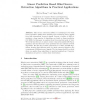Free Online Productivity Tools
i2Speak
i2Symbol
i2OCR
iTex2Img
iWeb2Print
iWeb2Shot
i2Type
iPdf2Split
iPdf2Merge
i2Bopomofo
i2Arabic
i2Style
i2Image
i2PDF
iLatex2Rtf
Sci2ools
100
click to vote
ICA
2007
Springer
2007
Springer
Linear Prediction Based Blind Source Extraction Algorithms in Practical Applications
Blind source extraction (BSE) is of advantages over blind source separation (BSS) when obtaining some underlying source signals from high dimensional observed signals. Among a variety of BSE algorithms, a large number of algorithms are based on linear prediction (LP-BSE). In this paper we analyze them from practical point of view. We reveal that they are, in nature, minor component analysis (MCA) algorithms, and thus they have some problems that are inherent in MCA algorithms. We also find a switch phenomenon of online LP-BSE algorithms, showing that different parts of a single extracted signal are the counterparts of different source signals. The two issues should be noticed when one applies these algorithms to practical applications. Computer simulations are given to confirm these observations.
Related Content
| Added | 08 Jun 2010 |
| Updated | 08 Jun 2010 |
| Type | Conference |
| Year | 2007 |
| Where | ICA |
| Authors | Zhi-Lin Zhang, Liqing Zhang |
Comments (0)

